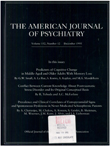Severity of psychiatric symptoms after HIV testing
Abstract
OBJECTIVE: The authors were interested in the psychiatric effects of serological testing for HIV and what information feasibly available at intake might predict more severe psychiatric symptoms 1 year later. METHOD: HIV testing in a private office setting was offered to adults at perceived risk for HIV infection but without AIDS. At entry, then 6 and 12 months later, subjects were counseled by psychiatric nurses and assessed by the Hamilton Rating Scale for Depression, Beck Depression Inventory, Spielberger State-Trait Anxiety Inventory, and Brief Symptom Inventory. RESULTS: Mean scores on all measures of psychiatric symptoms were lower at follow-up among both 106 HIV-positive and 222 HIV- negative adults. One year after HIV testing, 121 (37%) of the 328 subjects had scores associated with psychopathology. These elevated scores were not predicted by serostatus but by initial psychopathological scores (N = 150), annual income less than +15,000 (N = 114), being female (N = 46), and history of injection drug use (N = 32) and heterosexual risk factors (N = 60) as compared to males having sex with males (N = 236). CONCLUSIONS: Before the development of more severe physical symptoms, on average, knowledge of HIV infection does not increase psychiatric morbidity; however, regardless of serostatus, a notable percentage of at-risk adults have sustained high levels of psychiatric symptoms. Counseling during the HIV testing process provides an opportunity to identify these individuals for closer study and indicated psychiatric treatment.
Access content
To read the fulltext, please use one of the options below to sign in or purchase access.- Personal login
- Institutional Login
- Sign in via OpenAthens
- Register for access
-
Please login/register if you wish to pair your device and check access availability.
Not a subscriber?
PsychiatryOnline subscription options offer access to the DSM-5 library, books, journals, CME, and patient resources. This all-in-one virtual library provides psychiatrists and mental health professionals with key resources for diagnosis, treatment, research, and professional development.
Need more help? PsychiatryOnline Customer Service may be reached by emailing [email protected] or by calling 800-368-5777 (in the U.S.) or 703-907-7322 (outside the U.S.).



